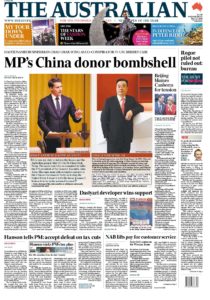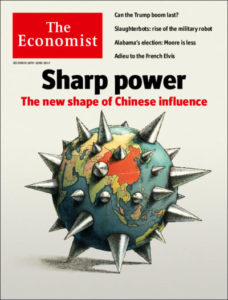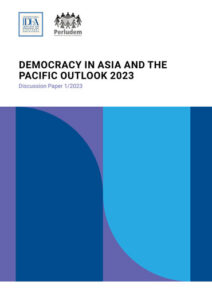 A coordinated foreign influence campaign linked to the Chinese government is using social media to undermine confidence in Australia’s democratic system, according to researchers at Canberra defence thinktank. The network is operating from within China and is either spreading disinformation about Australian politics or amplifying concerns about political scandals, The Guardian reports.
A coordinated foreign influence campaign linked to the Chinese government is using social media to undermine confidence in Australia’s democratic system, according to researchers at Canberra defence thinktank. The network is operating from within China and is either spreading disinformation about Australian politics or amplifying concerns about political scandals, The Guardian reports.
“What we’ve identified is a politically motivated campaign targeting the Australian political system by amplifying content about sexual assault and misconduct allegations in Parliament House and spreading disinformation about those cases in order to undermine trust in Australian politicians, politics and, ultimately, Australian democracy,” said Albert Zhang, a disinformation analyst at the Australian Strategic Policy Institute. The network is believed to be Spamouflage, a Chinese state-aligned foreign interference operation that has targeted many nations.
The news broke amid calls for Canada’s federal government to ban authoritarian state broadcasters, including the China Global Television Network.
 As the Toronto Star reported, the international human rights organization Safeguard Defenders lodged a complaint with the Canadian Radio-television and Telecommunications Commission (CRTC) back in 2019 against China Global Television Network (CGTN) and China Central Television’s Chinese-language international channel CCTV-4.
As the Toronto Star reported, the international human rights organization Safeguard Defenders lodged a complaint with the Canadian Radio-television and Telecommunications Commission (CRTC) back in 2019 against China Global Television Network (CGTN) and China Central Television’s Chinese-language international channel CCTV-4.
Authoritarianism is on the wane because it has not been delivering the goods. Asian admiration for China’s model of governance has been diminished by President Xi Jinping’s blunders handling the economy, covid-19 and relations with America, The Economist observes:
Points of light are not necessarily a pattern. And, it must be said, vast swathes of Asia are yet to know democracy at all. China, Laos and Vietnam are three of the world’s four surviving Leninist dictatorships—and then there is North Korea. Yet the political mood in Asia appears to have changed.
 China, disinformation, electoral authoritarianism and militarization are addressed in a new report from International IDEA’s inaugural Democracy in Asia and the Pacific Outlook Forum.
China, disinformation, electoral authoritarianism and militarization are addressed in a new report from International IDEA’s inaugural Democracy in Asia and the Pacific Outlook Forum.
China’s desire for internal political stability and the increasingly personalist nature of its regime and political system appear to have shaped its decision-making, as has its evolving assessments of what the Ukraine conflict might mean for Taiwan, according to Sheena Chestnut Greitens, associate professor at the LBJ School of Public Affairs at the University of Texas at Austin, where she directs UT’s Asia Policy Program.
She discusses China’s Response to War in Ukraine with the Hoover Project on China’s Global Sharp Power (below).







